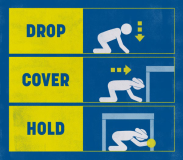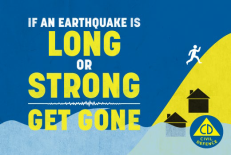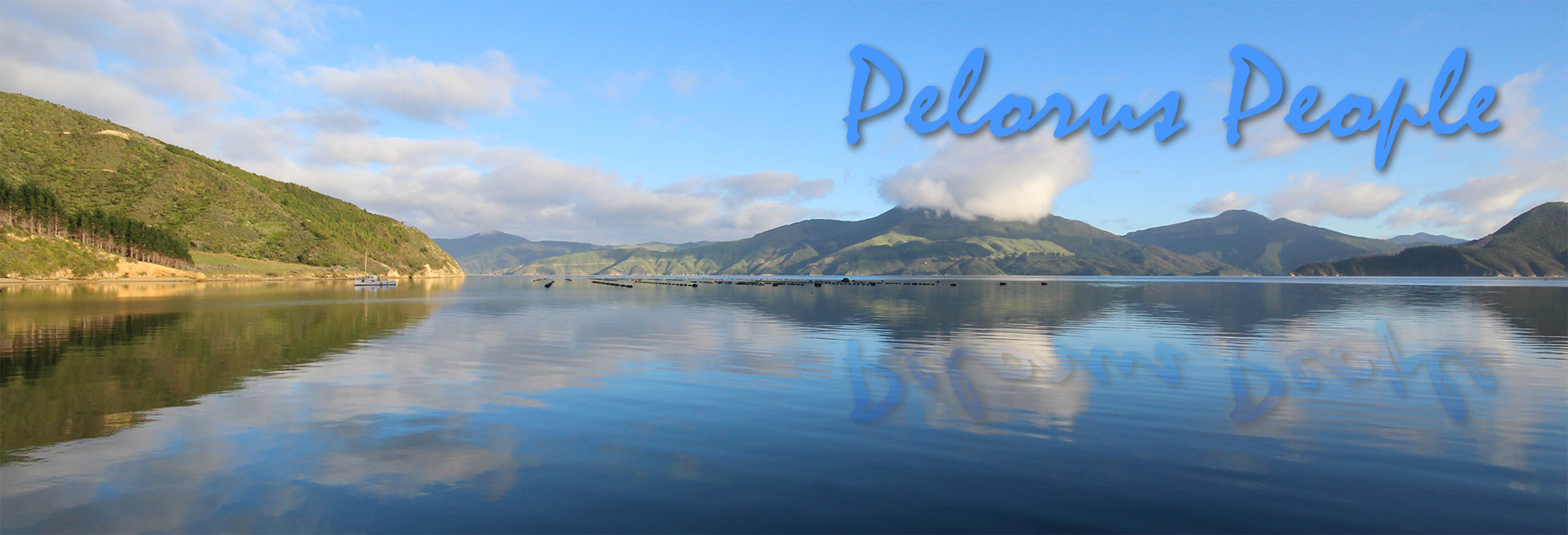Are you prepared for an Emergency? 
Disaster can strike at any time!
Top tips
Take note of natural warning signs. These are your first and best warning for any emergency.


Note that Marlborough has no civil defence or tsunami warning sirens. Fire sirens are not used to warn of a civil defence emergency.
Stay safe, stay informed
We all need accurate information in an emergency. Here’s some of the ways you can get the information you need.
Emergency Mobile Alert (EMA):
The Emergency Mobile Alert system enables messages about emergencies to be sent by authorised emergency agencies to capable mobile phones. The alerts are designed to keep people safe and are broadcast to all capable phones from targeted cell towers.
Radio:
Listen to the radio for updates and warnings. If you don’t have power, use a battery powered radio, a car radio or listen in online.
Marlborough CDEM can broadcast live on Brian FM in an emergency. For Havelock listen to 100.1FM
Social media:
Social media is a great way to share information. Try to stick to sources that provide validated information, such as Marlborough District Council’s facebook™ or twitter™ feeds or information from the National Emergency Management Agency (NEMA).
Antenno:
Council’s Antenno app gives you notifications and alerts about places you care about, not just in an emergency.
VHF radio:
There is a VHF radio at Havelock School and this enables information to be provided to Marlborough CDEM if there are no other means of communication in an emergency.
Marlborough CDEM can also broadcast on Marlborough Nelson Marine Radio Channels 63 and 65. Avoid using these channels in an emergency unless life is at immediate risk; every time you use that channel, someone else can’t.
Community response planning
In an emergency, people in Havelock may need to support themselves for up to 10 days before assistance arrives. If our community is well-prepared, we’re more likely to be able to look after ourselves and others in an emergency. This plan contains:
• A short description of Havelock and our people
• Information about key hazards and risks
• Information about assets and resources
• Advice about places where the community can gather (community emergency centres)
Hazards and risks
Earthquake
All of New Zealand is subject to the effects of earthquakes. Marlborough has an active fault system and could be impacted by major faults such as the Alpine Fault and an earthquake on the Hikurangi subduction zone.
In addition to building damage within the town, impacts could include extensive damage to the foreshore and marina, with buildings located on reclaimed land.
An earthquake may also result in landslides and damage to lifelines (power, water, communication, roads).
Tsunami
Havelock could be impacted by tsunami, either from an earthquake close to New Zealand or an offshore earthquake that results in a tsunami. In a tsunami much of Havelock including the marina and foreshore is likely to be inundated.
Storms and flooding
Havelock is bounded by the Kaituna and Pelorus Rivers. Flooding in either catchment can affect roads in and out of Havelock.
A severe weather event can also lead to slips and closures on SH6 and the Queen Charlotte Drive, as well as surrounding roads.
Fire
Havelock is surrounded by native bush and scrub. A bushfire could have a significant impact on Havelock, closing roads and requiring evacuation of much of the town. A bushfire near to Havelock could result in people evacuating into Havelock itself, placing extra demand on services.
Biosecurity
A biosecurity emergency impacting on aquaculture would have a severe impact on Havelock. Other biosecurity emergencies could threaten industries including farming and forestry.
Other hazards
The impacts of the 2020 COVID-19 emergency continue to be felt in Havelock, affecting the local economy as well as individuals.
Other hazards that could affect our region (such as a terrorist attack) are set out in the Marlborough Civil Defence Emergency Management Group’s plan (www.marlborough.govt.nz/civil-defence-emergency-management/about-us).
Havelock’s people
Havelock is located at the head of Te Hoiere/Pelorus Sound. It is on State Highway 6, on the main route between Blenheim and Nelson. Ngati Kuia are the tangata whenua of Havelock and surrounding areas, with whakapapa to the earliest people of Te Tauihu. Long before European settlement, Motuweka Pa was at the junction of two important trails for Māori, from Waitohi (Picton) and the Wairau.
From its early European days servicing the gold-mining, fishing and forestry industries, Havelock is now the centre of much of New Zealand’s green-lipped mussel industry and a strong tourist industry. The town has a health centre, ambulance and fire service, one primary school and an early childhood centre.
The broad geographic area for the Havelock Community Response Plan is on the map below. These are not fixed boundaries, as a specific emergency may impact on a wider area.
The resident population of Havelock is approximately 500 people, with others coming in daily from surrounding areas to work (particularly in aquaculture), to attend school and as summer visitors either staying locally or in transit, particularly to holiday accommodation in the Kenepuru and Pelorus Sounds.
In keeping with the rest of New Zealand, Havelock has an ageing population, with people moving into Havelock for retirement. A shortage of rental accommodation also means that some families are moving from the township itself, while continuing to send children to the local school.
The school population is becoming increasingly ethnically diverse, which brings a new dimension to Havelock.
People who could be severely impacted in an emergency
Emergencies affect all of us. Depending on the nature, extent and timing of an emergency some people can be more affected than others. Although it can be hard to generalise, such groups include:
• Children at school or early childhood centres, particularly those who have parents living or working outside of Havelock
• Older people with few social connections and/or in poor health
• People with health conditions that are dependent on access to lifesaving treatment (e.g. renal dialysis).
• People who work in Havelock and live elsewhere, but are unable to return home in an emergency
• People who are visiting or travelling through Havelock and become stranded by an emergency
Our resources
Havelock has a range of assets (‘goods and services’) that can be used to support the community in an emergency. The assets list below is included as a planning prompt in times of emergency. We also have a community with a wide range of skills that make us resilient in the face of an emergency.
Assets
This is an indicative list only. Not all these assets will be available or accessible in an emergency and some are dependent on a continued supply of electricity or fuel. In all cases the owner/operator of the business MUST be consulted prior to use of any of their goods or services. Individuals are expected to pay for goods and services.
It’s important to remember that Marlborough CDEM does not pay for the use of assets in an emergency, unless those assets are specifically commissioned or contracted by Marlborough CDEM.
| Assets | Can be used to support... |
|---|---|
| Air strip/helicopter landing pag | Emergency transport in/out |
| Cool storage | Bulk food storage (dependant on alternate power for perishable supplies |
| Supermarket, cafes, eating houses • 4 Square • Ray’s Place • Blue Kaff • Sneaky Beach • Havelock Takeaways • Havelock Hotel • Captain’s Daughter | Local food stocks and food handling expertise |
| Community Garden | Fresh Fruit and Vegetables |
| Generators (public & Private | Emergency power for food storage medication storage |
| Commercial and private vessels, including barges | Alternate transport, maintaining contact with Sounds residents |
| Fuel supplies & LPG • Havelock Service Station • ITM Havelock (LPG) • 4 Square (LPG) | Maintaining infrastructure and lifelines as well as public use |
| Community Van | Transport for people without their own means of transport |
| Building and Hardware • ITM Havelock | Access to materials, tools and expertise |
| Heavy machinery | Can be contracted by CDEM or individuals to clear roads, driveways etc |
| Accommodation providers • Havelock Motels • Garden Motels • Holiday Park | Alternate accommodation |
| Boatsheds | Storage |
| Havelock HealthCare | Basic health supplies |
| Emergency services Police, fire, ambulance | First responders in an emergency |
| Emergency water supply Havelock school | Emergency water if mains water supply is compromised |
| Civil defence VHF radio | Direct communication with Marlborough CDEM Emergency Operations Centre |
People
It is with the support of people in our community that we can get through and recover from an emergency.
| People | Can support... |
|---|---|
| Pelorus Area Health Trust | Knowledge of primary health needs and services in the region |
| Menzshed | Tools and people to use them |
| Tradespeople | Wide range of practical skills including builders, electricians plumbers and other trades-certified practitioners |
| Havelock Community Association | Wide knowledge of Havelock Community, Communications Networks |
| Long-term residcnts | Understanding of the community including community history |
| School and ECE community | Maintain continuity of schooling and early childhood education as well as a networkk of parents and carers |
| Church communities | Support to each other, knowledge of community needs |
Community emergency centres
Depending on the emergency, any safety considerations and the consent of the building owner, we can open a community emergency centre at Havelock School Hall (the preferred site due to geographical location and equipment held at that site). It is up to the community to decide the most appropriate place at the time.
If the school cannot be used the following locations could be considered
• Havelock Pavilion
• Havelock Town Hall
There is a group of people who can access the Havelock School, operate the radio and run the generator and turn on the emergency water supply if required. The generator can also be used to provide power to the preschool and St John Ambulance base adjacent to the school.
Keys to the school are held by various teaching staff and a set of keys is stored in a lockbox. The lockbox number is known by community members from groups such as Lions and the Havelock Menzshed. A community emergency centre is somewhere people can go for information and to be with other people. It is not a civil defence centre and should not be used for emergency accommodation. Havelock School has a resource kit and a pavement sign that can be used in running a community emergency centre and Marlborough CDEM can provide support if necessary.
Marlborough CDEM will decide whether a civil defence centre needs to be set up in Havelock, after talking with people from the local community.
Find out more
Take a look at SmartMaps on the Marlborough District Council website for information about tsunami inundation zones around Havelock https://maps.marlborough.govt.nz/smartmaps
Get Ready for more information about how to get ready for an emergency at home, at work and at school www.getready.govt.nz
Read about the Marlborough civil defence emergency management group and find information that might help you https://www.marlborough.govt.nz/civil-defence-emergency-management



